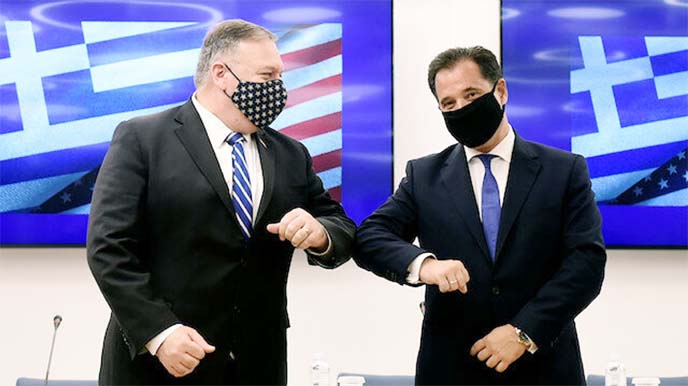
Al Jazeera News :
US Secretary of State Mike Pompeo has begun a two-day visit to Greece for talks aimed at de-escalating tensions in the eastern Mediterranean and setting the groundwork for dialogue between Athens and Ankara.
The often-testy relations between Greece and neighbouring Turkey have deteriorated sharply this year, particularly over maritime boundaries and exploration rights in the Eastern Mediterranean. The dramatic escalation in tension has raised fears of a war between the two NATO members.
Ahead of Pompeo’s trip, which began on Monday, a senior US official said Washington was keen to dampen down the tension, reduce the likelihood of “accidents or incidents” and for Greece and Turkey to complete an agreement.
Turkey on August 10 sent a research vessel, accompanied by warships, to prospect for energy resources in an area Greece claims as its own continental shelf and, therefore, its exclusive economic zone. Athens has sent its own warships to the area.
Turkey’s Oruc Reis seismic research ship has since returned to waters near southern Turkey, a move Greece hailed as a “positive step”.
But Turkey later extended the operations of its Yavuz energy drillship in the disputed area off Cyprus until October 12, which Cyprus decried as a sign Ankara was expanding “illegal drilling”.
European powers, who tend to side with Greece, have raised concern about a wider escalation.
But last week the rivals, both NATO members, said they were ready to start talks.
“Let’s meet, let’s talk and let’s seek a mutually acceptable solution. Let’s give diplomacy a chance,” Greek Prime Minister Kyriakos Mitsotakis said in a plea to Turkish President Recep Tayyip Erdogan, in an address on Friday to the virtual UN General Assembly.
Pompeo will fly to the Greek island of Crete on Tuesday and tour the NATO naval base, Souda Bay.
Mitsotakis, who is hosting Pompeo at his family home, wants closer military ties with the US.
The US secretary of state signed a defence agreement last October allowing US forces broader use of Greek military facilities.
A key element of the October deal was the northern Greek port of Alexandroupolis, a Balkans and Black Sea gateway of strategic value to the US Navy and NATO.
The US has been granted priority status to the port after paying roughly $2.3m to remove a sunken dredging barge that had blocked part of the harbour since 2010.
At the time, Greek officials said the Pentagon was expected to invest more than $14m in the Greek airbase of Larissa and approximately six million euros ($6.99m) at Marathi, part of the Souda base.
A September 24-25 EU Council meeting, with the Eastern Mediterranean crisis on the agenda, was postponed because the council’s president, Charles Michel, tested positive for the coronavirus. That meeting is now scheduled to take place on October 1-2.
US Secretary of State Mike Pompeo has begun a two-day visit to Greece for talks aimed at de-escalating tensions in the eastern Mediterranean and setting the groundwork for dialogue between Athens and Ankara.
The often-testy relations between Greece and neighbouring Turkey have deteriorated sharply this year, particularly over maritime boundaries and exploration rights in the Eastern Mediterranean. The dramatic escalation in tension has raised fears of a war between the two NATO members.
Ahead of Pompeo’s trip, which began on Monday, a senior US official said Washington was keen to dampen down the tension, reduce the likelihood of “accidents or incidents” and for Greece and Turkey to complete an agreement.
Turkey on August 10 sent a research vessel, accompanied by warships, to prospect for energy resources in an area Greece claims as its own continental shelf and, therefore, its exclusive economic zone. Athens has sent its own warships to the area.
Turkey’s Oruc Reis seismic research ship has since returned to waters near southern Turkey, a move Greece hailed as a “positive step”.
But Turkey later extended the operations of its Yavuz energy drillship in the disputed area off Cyprus until October 12, which Cyprus decried as a sign Ankara was expanding “illegal drilling”.
European powers, who tend to side with Greece, have raised concern about a wider escalation.
But last week the rivals, both NATO members, said they were ready to start talks.
“Let’s meet, let’s talk and let’s seek a mutually acceptable solution. Let’s give diplomacy a chance,” Greek Prime Minister Kyriakos Mitsotakis said in a plea to Turkish President Recep Tayyip Erdogan, in an address on Friday to the virtual UN General Assembly.
Pompeo will fly to the Greek island of Crete on Tuesday and tour the NATO naval base, Souda Bay.
Mitsotakis, who is hosting Pompeo at his family home, wants closer military ties with the US.
The US secretary of state signed a defence agreement last October allowing US forces broader use of Greek military facilities.
A key element of the October deal was the northern Greek port of Alexandroupolis, a Balkans and Black Sea gateway of strategic value to the US Navy and NATO.
The US has been granted priority status to the port after paying roughly $2.3m to remove a sunken dredging barge that had blocked part of the harbour since 2010.
At the time, Greek officials said the Pentagon was expected to invest more than $14m in the Greek airbase of Larissa and approximately six million euros ($6.99m) at Marathi, part of the Souda base.
A September 24-25 EU Council meeting, with the Eastern Mediterranean crisis on the agenda, was postponed because the council’s president, Charles Michel, tested positive for the coronavirus. That meeting is now scheduled to take place on October 1-2.

